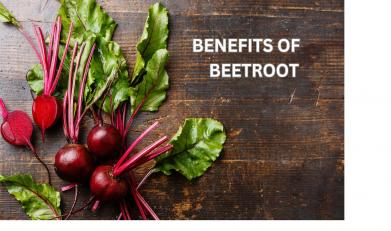

07 Jun, 2024
Beetroots, with their vibrant color and earthy flavor, are much more than just a pretty addition to your plate. These root vegetables are packed with essential nutrients and offer a myriad of health benefits that make them a worthy inclusion in your diet. Whether you enjoy them roasted, juiced, or raw, here's a deep dive into why beetroots deserve a place in your nutritional repertoire.
Nutrient-Rich Profile
Beetroots are a nutritional goldmine. They are low in calories yet high in essential vitamins and minerals. A typical serving of beetroot provides a good dose of:
Boosts Heart Health
Beetroots are renowned for their heart health benefits. They contain high levels of nitrates, which the body converts into nitric oxide. Nitric oxide helps to relax and dilate blood vessels, improving blood flow and lowering blood pressure. Studies have shown that regular consumption of beetroot juice can lead to significant reductions in blood pressure, reducing the risk of heart disease and stroke.
Enhances Athletic Performance
Athletes often turn to beetroot juice as a natural performance enhancer. The nitrates in beetroots improve the efficiency of mitochondria, the powerhouses of our cells, enhancing endurance and reducing the oxygen cost of exercise. This means that athletes can perform better for longer periods. Research has shown that beetroot supplementation can enhance stamina, increase exercise tolerance, and improve overall physical performance.
Supports Brain Health
As we age, cognitive function naturally declines, but the nitrates in beetroots can help mitigate this process. Nitric oxide promotes increased blood flow to the brain, improving cognitive function and potentially reducing the risk of dementia. Some studies suggest that regular consumption of beetroot juice can improve brain function and delay cognitive decline.
Anti-Inflammatory and Antioxidant Properties
Beetroots are rich in betalains, the pigments that give them their deep red color. Betalains have powerful anti-inflammatory and antioxidant properties, helping to protect cells from damage, reduce inflammation, and lower the risk of chronic diseases such as heart disease and cancer. Additionally, beetroots' high fiber content supports gut health and reduces inflammation.
Promotes Digestive Health
Fiber is essential for a healthy digestive system, and beetroots are a great source of dietary fiber. Consuming beetroots can help prevent digestive issues like constipation, promote regular bowel movements, and support overall gut health. The fiber content in beetroots also aids in maintaining healthy cholesterol levels, further contributing to heart health.
Detoxification Support
The betalin pigments in beetroots support the liver's detoxification process. These compounds help the liver neutralize toxins and aid in their excretion from the body. Regular consumption of beetroots can support liver function and overall detoxification processes, keeping your body running efficiently.
Conclusion
Beetroots are a versatile and highly nutritious vegetable that can significantly benefit your health. From improving heart health and enhancing athletic performance to supporting brain function and aiding in detoxification, the humble beetroot is a powerhouse of nutrients. Incorporate beetroots into your diet and reap the numerous health benefits they offer. Your body will thank you!